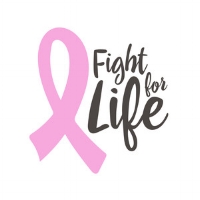Making Sense of a Cancer Diagnosis
Cancer. No one could prepare me for that. It didn't matter that it ran rampant on my father's side of the family. It didn't matter that a sister was battling it. That was them-- not me. How am I going to get through this?!
YOUR MIND MAYBE ALL OVER THE PLACE AND THAT'S OKAY.
I have six tips to help you get past the diagnosis and on to living. While these tips are specific to breast cancer, they are relevant for any chronic condition.
1. Let it Out. Whether it's crying, screaming, hitting a pillow or just staring off into space, let it out. You may want to call a friend or just sit and silence and embrace the news. There is no right or wrong way to react. Do what feels natural and is safe.

2. Determine to Fight. My diagnosis date was September 29, 2017. That's the same date I became a survivor. For me, there is no waiting for five years post surgery or whatever else to say I survived. Dealing with daily emotional and mental turmoil is part of the survivor process and it starts day 1 with a mindset to fight and win.
3. Maintain a Health Record. You may have to see multiple specialists and reciting the same information gets old very quickly. Put all your information in one place and whip it out whenever needed. I kept my information electronically as well as in a 3 hole binder. Choose whatever works for you and stick with it. Items to keep in your health record:
- Family history (name, current age or age at death, relationship, illnesses, cause of death if known)
- List of medications (prescribed and over the counter)
- List of emergency contacts
- Bills (be sure to write when payment was made) and insurance approvals
- CDs of MRIs, mammograms, ultrasounds, etc. and the related reports
- Diagnostic Reports (pathology, OncoType, blood assessments, etc.)
- Living Will
- Notepaper or journal (like the one in the Diagnosis box)

4. Build a Team. When things first started getting dicey, I reached out to my family and closest friends for help. They listened as I cried. They offered suggestions. They went to appointments with me. They made me laugh. They were part of my post surgery care team. They respected my privacy and allowed me to walk this phase of life on my own terms and that was very important to me. They became the village I depended on for survival. Whether it's one person or dozens, please don't go through this alone.
5. Research and Ask Questions. Doctors are wonderful and they make great recommendations. However, you need to know a little (or a lot depending on your personality) about your illness and current industry recommendations. Don't be afraid to ask questions or get a better understanding of what's going on. It's your body and you need to know what to expect-- physically and emotionally. Once you get the facts, center yourself and determine what options give you the most peace. From there move forward in confidence--- regardless if others agree or disagree with your decision.
6. Live. Cancer does not define you. It's simply a condition that you have to address. Don't let it stop you from doing all the things you want to do. Make the necessary adjustments and live, laugh and love like never before.
What suggestions do you have for managing a cancer diagnosis?